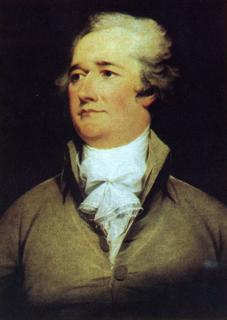 "A host within himself" Jefferson on Hamilton
"A host within himself" Jefferson on HamiltonGeorge Will, an editorialist for the Washington Post, wrote a fascinating article on the life and legacy of John Marshall, the Supreme Court’s most influential chief justice. Will quite correctly laments that far too few Americans seem to be aware of the impact this erudite justice had on the young nation. While justifiably deserving of the praises heaped upon Marshall by Will, I think he goes a little too far in accrediting Marshall as being “the most important American never to have been president.” Will’s acclamation of Marshall goes further in claiming that, "his historic importance is greater than that of all but two presidents-George Washington and Abraham Lincoln." If I may humbly submit that I believe another American of the same period is even more deserving of these tributes, someone who, like Marshall has been overshadowed by the other gods in the American pantheon . This American is Alexander Hamilton.
Joseph Ellis, today’s preeminent historian of the founding era, accredits Hamilton as “the most brilliant” of the founders. Hamilton fought bravely along side Washington in the War for Independence, and became one of Washington’s closest friends. After the war, as America tried to forge its new destiny, Hamilton played a no less important role in the events of the day. In a stunning six hour speech at the Constitutional Convention, Hamilton laid out the basic framework, plus or minus a few important elements, for what was to become the United States government. Gifted with prodigious energy and talents, he wrote the bulk of the Federalist Papers, fighting tooth and nail to get the Constitution ratified. He saved the great state of New York from everlasting shame as the sole signer among the three delegates hailing from that state attending the Constitutional Convention. The Federalist Papers remain the undisputed best source for explaining American political theory. As the nation’s first Secretary of the Treasury, Hamilton single handedly laid the framework for what was eventually to become the behemoth American market economy. He was an economic prophet and saw generations beyond the somewhat naïve and limited Jeffersonian vision of America remaining an agrarian nation. His exhaustive letter to Washington, arguing for the constitutionality of the national bank, provided the framework for the more liberal reading of the “necessary and proper” clause that Marshall later advanced. His own contributions to American law are so impressive that John Marshall stated that, next to Hamilton, he felt “like a candle held up to the sun at noonday.” Perhaps the most remarkable tribute to Hamilton came from an unlikely source, Thomas Jefferson. “Hamilton is really a colossus to the anti-Republican (Federalist) Party. Without numbers, he is a host within himself.” It is my opinion that, after Washington, Hamilton is America’s greatest statesman. I agree wholeheartedly with Will’s assessment of Hamilton, “There is an elegant memorial in Washington to Jefferson, but none to Hamilton. However, if you seek Hamilton's monument, look around. You are living in it. We honor Jefferson, but live in Hamilton's country, a mighty industrial nation with a strong central government."

Thanks for the comments, your points are enlightening. Seeing how powerful the federal government has become, and the rise of the omnipotent judiciary, one has to take Jefferson's concerns over the Hamiltonian vision seriously. On the other hand, at the time, what was needed was a strong government to replace the pathetically weak Articles of Confederation. Foreign powers still remained a threat. So this brings me back to Hamilton's side for a government with some backbone. He couldn't have predicted the out of control, run away assumption of power by the federal government at the expense of the states that we see today. It's interesting to see that the respective visions of these two men are felt so strongly today, well over two hundred years later.
ReplyDelete